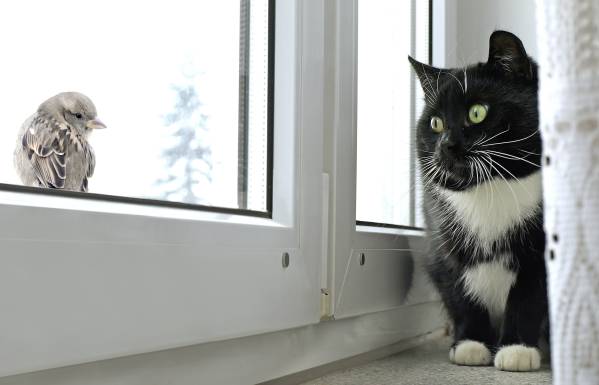Has your cat just eaten a bee? Are you worried the bee will make your cat sick? Then you’ve come to the right place!
Connect with a verified veterinarian in minutes. Licensed vets are available 24/7 to answer your questions. No need to worry about your furry family member.
In this article, we’ve put together information on bees and whether or not they can make your cat sick. Let’s get started!
Bees & Cats
Cats will chase just about anything—including bees. Why do cats chase bees? There are a number of reasons why cats love to chase bees. For one thing, bees are something fun and interesting to watch and chase. Some bees fly and zip around so fast you can hardly see them. Then there are other bees that fly around more slowly. They kind of hum along. Either way, cats may see bees as interesting and challenging.
We use the term “challenging” because bees are not normally a part of a cat’s diet. For this reason, cats must go after bees simply because they find it fun and something challenging. Cats can be little daredevils, after all.
Have you ever tried to catch a bee? It’s not so easy! However, cats are lucky enough to catch their bee prey once in a while.
What Happens if a Cat Eats a Bee?
If your cat eats a bee, then there’s nothing to worry about. It may be the cat was not stung before swallowing the bee. However, it is possible for cats to be stung by a bee when trying to catch and eat the flying insect.
The main concern is monitoring your cat for an allergic reaction if she was stung. Some cats are allergic to bee venom.

Review symptoms, medications & behavior to keep your pets healthy with a Vet Online in just minutes.
Ask a Vet Live NowSymptoms of Allergic Reaction to Bee Venom in Cats
You may notice these symptoms if your cat has been stung by a bee and is having an allergic reaction to the venom:
- Rapid breathing (breathing difficulties)
- Changes in behavior/agitation
- Hives
- Excessive drooling
- Vomiting
- Diarrhea
- Dizziness
- Disorientation
- Seizures
- Swelling
- Itching
- Pawing at face/chewing area that was stung (such as a paw)
If you notice these symptoms in your cat, then it’s time to call the vet. This may be a medical emergency.
Treatment of an Allergic Reaction to Bee Venom in Cats
The vet will first give your cat a complete physical, which may include lab work. Once they’ve determined your cat is having a reaction to the bee’s venom, the vet will work to treat the allergic reaction and prevent shock (which can happen in cases of a severe allergic reaction).
Treatment may involve an IV for fluids and medications. The vet may use antihistamines and corticosteroids to treat your cat’s allergic reaction. They may also need to use epinephrine if the reaction is severe. It’s possible your kitty may need to stay in the hospital for a couple of days. The vet will continue to monitor her symptoms and ensure she’s stable before going home.
The good news is that cats who receive prompt medical treatment for a bee sting will make a full recovery. And we’re sure they will avoid bees in the future!
Connect with a verified veterinarian in minutes. Licensed vets are available 24/7 to answer your questions. No need to worry about your furry family member.

Julie
Julie is a graduate of the University of North Carolina, Wilmington, where she studied Animal science. Though contrary to the opinion of her parents she was meant to study pharmacy, but she was in love with animals especially cats. Julie currently works in an animal research institute (NGO) in California and loves spending quality time with her little cat. She has the passion for making research about animals, how they survive, their way of life among others and publishes it. Julie is also happily married with two kids.
Review symptoms, medications & behavior to keep your pets healthy with a Vet Online in just minutes.
Ask a Vet Live Now



